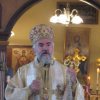Bishop Georgije, baptized Djordje Djokić, was born on May 6, 1949 in the village of Crnjelovo, Bjeljina, of parents Krsto and Krunija. After elementary school he resided in the monasteries Tavna, Ozren and Kosijerevo. He completed monastic school in the Monastery of Transfiguration 1963/1964. From Savina Monastery he went to the Studenica Monastery and remained until 1966 when he went to School at the Ostrog Monastery. After finishing Monastic School he was tonsured into monastic rank at the Monastery Ozren on February 11, 1971 and was given the monastic name Georgije. He was ordained hierodeacon on February 15, 1971. In June 1971, he was appointed spiritual father of Tavna Monastery by Bishop Longin. From there he graduated from the Seminary in Sremski Karlovci and the Faculty of Orthodox Theology in Belgrade. While in England, Fr. Georgije was appointed by Bishop Lavrentije to serve the parish of Sts. Peter and Paul in Derby, England. While there he was elected Bishop for the Canadian Diocese, on May 16, 1984. On June 8, 1984, he was consecrated a bishop by Patriarch German and installed in 1984 at the St. Nicholas Cathedral in Hamilton.
Bishop Georgije revived Church life in the Canadian Diocese, by organizing several new Church School Congregations, founding the Federation of Serbian Sisters, establishing the religious magazine Istočnik, pub-lished quarterly in both languages. He founded the Holy Transfiguration Monastery in Milton, near Toron-to, as the spiritual center of the Canadian Serbs. The Diocese purchased a home in one of the exclusive are-as of Toronto at 5A Stockbridge Avenue for the sum of $235,000. The Diocesan offices were located in the new residence. On the initiative of Bishop Georgije, the facilities in the lower level of the residence were adapted into a chapel. The frescos in the chapel are made by iconographer Hieromonk Pavle Kalanj, from Monastery Gradiste in Montenegro. The iconostasis and other items in the Chapel were done by Canadian Serb carpenters. The Chapel is dedicated to Three Holy Hierarchs and was consecrated on February 15, 1986.
Bishop Georgije filled vacancies in the parishes, organized new Church School Congregations and pro-vided spiritual care for every Serbian Community, large or small. He successfully motivated Church School Congregations to build new churches, church centers and parish residences, as well as to renovate and ex-panding existing ones.
During his thirty one years of archpastoral work the Diocese grew from eight parishes to thirty and the same number of the parish priests. As a crown of the accomplishments is the Transfiguration Monastery in Milton, Ontario. Bishop Georgije retired per the decision of the Holy Assembly of Bishops and currently resides in Milton, Canada.





